 |
|
NEW In This Issue!
|

Issue #0016 - Published by L. Neilson
KKI is absolutely committed to teaching what is believed to be the “Truth” about canines and their behavior. KKI will always put the well being of the dog first and foremost, even in the face of adversity.
|

You ask, "What is a working dog?" "Is it a dog that does more than hang out at the house all day and bark at the mailman?" "Is it a dog that gets in the car like Mom and Dad and goes to the office?" Well, sort of ...
Working dogs are amazing animals specially trained to protect people and to make life easier for them. Some working dogs act as eyes for blind people, ears for the hearing impaired, and helpers for the physically challenged (service dogs). A service dog is placed with an individual who has a physical disability and can work with his or her dog independently. Service dogs perform practical tasks, such as opening and closing doors for their handlers, turning light switches on and off, picking up things from the floor, pulling a wheelchair, and even carrying a purse or a bag. In addition, service dogs can be specifically trained to retrieve objects -- like the phone! Service dogs can even be trained to take off a handler's socks or coat.
They also protect sheep from wolves, and they can help a police officer catch criminals.
Search and Rescue dogs-(SAR) anytime there is a crime or a disaster (like an earthquake), are brought in to help. SAR dogs work hard to rescue people who are trapped or lost. They also track people who have committed crimes and fled. The dogs' noses are so good they are almost always able to sniff out and find what they are looking for-even if it's underground or water. These special dogs can find victims of disasters under lots of rubble, and they can find people lost in the woods. They are awesome.
Dogs instinctively know how to find things. A Handler, the dog's human partner, teaches the dog what to search for. A dog can use all of his/her senses, like hearing, seeing, and smelling to find a specific person or thing. To do this, though, requires a lot of training. They are always practicing, but the dogs love it because it is what they were born to do. Handlers and their dogs work together as a team. The Handler teaches the dog to find very specific things in all kinds of weird places like in a tree, in the woods or a field, in a suitcase, in a car, on a street, in a closet, under rubble, or in the water or under snow.
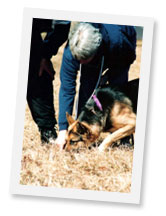
Tracking Dogs are trained to follow a track of human scent and crushed vegetation using their magnificent nose. The dog's nose is far superior to man's. The total number of olfactory cells in a human is about 5 million. The dog has 125 - 200 million. Its sensitivity is amazing. The dog can detect some odors at as little as one part in a trillion. A greater proportion of the dog's brain is devoted to the sense of smell, unlike in humans whose size of the olfactory area has decreased and the thinking part has increased. For this reason, when training, BELIEVE YOUR DOG as he is the best judge of what he smells!
|
|
Chemical Explosive Detection Dogs sniff out bombs, explosion debris, firearms, and ammunition. Other law enforcement working dogs find drugs, money, and people. Just how do they do it? They are trained to "sniff out" different explosive chemicals. During their extensive training, explosives scents are imprinted into the dog's memory and the dogs are trained on every type of explosive. This means that they can detect approximately 19,000 different combinations of explosives.
Trailing Dogs follow a trail composed of small skin cell tissue particles that corresponds to the scent article they were given as a reference.
Air Scent Dogs work without scent articles but by picking up traces of human scent drifting in the air. Because these dogs generally are not able to discriminate between scents of different persons the presence of other people in the area may affect the results. They are particularly useful in disaster work (collapsed buildings) to detect human scent in and around piles of debris.
Water Search Dogs focus on the bodily gasses that rise up from under the water. They work in a team with their handler either from a boat or the shore line with a diver ready to search the area indicated by the dog.
Cadaver Dogs react to scent emitted by a dead person. They are able to detect very minute pieces of human remains and even blood drops even if it is buried.
Disaster Dogs are trained to find humans in very unnatural settings such as might be found after tornadoes, hurricanes, earthquakes and other disasters. They must be able to work on very unstable ground and in confined spaces. These dogs generally are short compact dogs that can work off lead.
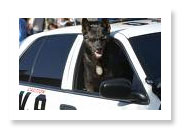 Police Dogs are trained to guard their handler and assist him or her in a variety of tasks. Some police dogs are also specially trained as detection dogs. Police dogs perform a long list of tasks, far to varied to mention here. Among the dogs that perform police work are the German Shepherd, Doberman Pinscher, Akita, Airedale, Labrador, Boxer, Bouviers and the list goes on. Police Dogs are trained to guard their handler and assist him or her in a variety of tasks. Some police dogs are also specially trained as detection dogs. Police dogs perform a long list of tasks, far to varied to mention here. Among the dogs that perform police work are the German Shepherd, Doberman Pinscher, Akita, Airedale, Labrador, Boxer, Bouviers and the list goes on.
Assistance and Service Dogs help physically or mentally challenged persons in their everyday activities. One of the most visible is the guide dog that assists blind or visually impaired people. There are also hearing dogs for the deaf, mobility assist dogs, who can open/close doors etc, walker dogs who provide balance assistance, alert dogs who can hit a button to call 911 in urgent cases, psychiatric service dogs that assist persons with mental disabilities or phobias.
|

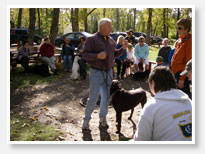 Larry of KKI at outdoor Seminar
Larry of KKI at outdoor Seminar
Seminar Host
Pearls of Wisdom
- Before you embark on a journey of revenge, dig two graves
- It does not matter how slowly you go so long as you do not stop.
- What counts is not necessarily the size of the dog in the fight --it's the size of the fight in the dog.
- No truth appears to me more evident than that beasts are endowed with thought and reason as well as men.
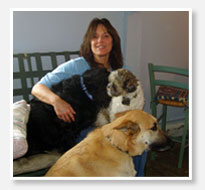 Dogsville Owner - Patti Galambos
Dogsville Owner - Patti Galambos
|
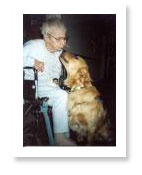
Therapy Dogs refers to dogs used to detect, treat and cure a host of diseases and conditions. Unlike service dogs, therapy dogs do not necessarily accomplish actions, but help the sick recover more quickly and the patients or aged persons to live longer and more satisfying lives.
Their therapeutic effect resides in their loving presence that can help lower blood pressure, release endorphins, and achieve specific treatment or program goals. Therapy dogs are now helping stroke victims and others to regain or build lost faculties. Increasingly these animals assist in the fields of nonphysical/medical therapies, helping the stressed and angry relax and the shy be more forthcoming. Dogs may also assist inmates in their resocialization and rehabilitation process. Juvenile offenders learn respect, compassion, and responsibility in the process of socializing and interacting with rescued homeless animals. Other programs, where inmates help in the training of service and assistance dogs, show how the prison system can aid in the rehabilitation of inmates while serving the community at large.

- Online class and seminar registration will be available soon
- Watch for Obedience Training Classes at Dogsville - coming soon
- Puppy Clinics - What you should know Before & After you get your puppy
- Under Consideration - Trainer Courses
- And one more... to be announced at a later date!
|
 |








